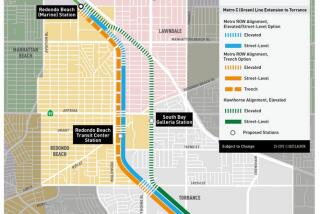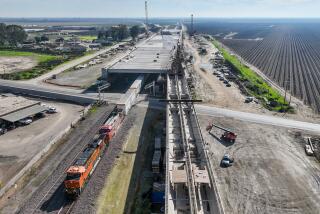Town Puts Stick in Spokes of Bikeway Plan
- Share via
WESTON, Mass. — Imagine: A bicycle trail through the state’s wealthiest suburb. Do you have any idea what kind of people would be pedaling into town? Ruffians, criminals--mountain bikers!
Something had to be done. And it was. A call to arms went out in this colonial-era town, where the average home sells for about $1 million. Residents drew a line in the sand trap: “The bikes stop here.”
A planned 23-mile bicycle trail that has already been approved by the five other Boston suburbs it passes through was rejected 690 to 410 by residents at a town meeting Dec. 8. Now, the bikes must stop at the Weston line.
“I’m a bit embarrassed for this town,” said Kate Detwiler, a resident who organized in favor of the trail. “I think there was an amount of narrow-mindedness.”
The decision leaves a 3-mile gap in the planned Wayside Rail Trail between Waltham and Berlin. It was also a rare defeat for advocates of so-called “rail trails.” Across the country, more than 900 of the paved bike pathways have been built along abandoned railroad beds, most of them over the last decade.
Where most see the trails as a chance to enhance their community, Weston residents reacted with a resounding “not in my backyard,” viewing the trails as a threat to their peace and quiet.
They feared the influx of bikers and walkers would intrude on their privacy and bring rowdiness and crime to their exclusive neighborhoods. Some said a public forest nearby would become a haunt for mountain bikers.
“It just plain didn’t fit the location,” said Douglas Gillespie, a trail opponent who chaired a task force that studied the issue.
Weston, with a state-leading average household income of $95,134, is the third community in the state to nix a rail trail in the last year, following two in western Massachusetts, Belchertown and Southampton.
In other places, especially the Midwest--where Wisconsin has 1,226 miles of bicycle trails, followed closely by Michigan and Minnesota--bicycle trails have generated much less controversy.
“What’s going on in Massachusetts seems to be an oddball thing,” said Hugh Morris, research coordinator for the national Rails-to-Trails Conservancy, a group that has pushed for the conversion of old rail lines into bikeways.
Eighty-five percent of the 250 bikeways that opened over the last two years faced no discernible opposition, Morris said.
Even in Massachusetts, a vote against a rail trail is rare. The state has 12 of them covering 120 miles, with 54 more under development. And the most heavily used rail trail in the country is here, the Minuteman Bikeway, which attracts more than 2 million riders a year.
“I think basically the fear of change here in Weston was so pervasive that people feared the worst,” said Detwiler, the trail proponent. “It was a much more pervasive fear than I had expected.”
More to Read
Sign up for Essential California
The most important California stories and recommendations in your inbox every morning.
You may occasionally receive promotional content from the Los Angeles Times.










